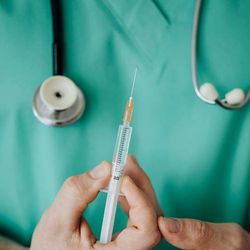Embracing IL-17 A/F Inhibition for Hidradenitis Suppurativa, Dermatologic Conditions - Episode 4
Safety Profile of Bimekizumab in Hidradenitis Suppurativa
In part 4 of our series, expert dermatologists discuss the safety profile of bimekizumab in HS relative to other disease states and trials.
In part 4 of our 5-part series, Martina Porter, MD, a dermatologist at Beth Israel Deaconess Medical Center, and Colleen Cotton, MD, a dermatologist with National Children's Hospital, provide a detailed overview of the safety profile of bimekizumab (Bimzelx), emphasizing its implications for patients with hidradenitis suppurativa (HS), particularly those with coexisting inflammatory bowel disease (IBD) or other safety concerns associated with IL-17 inhibitors.
Porter highlights promising findings regarding IBD in the bimekizumab trials. Patients with a history of IBD were allowed to participate if their condition was inactive and untreated prior to the study. Among this subset, no significant reactivation of IBD was observed, which is reassuring, particularly for pediatric patients who might be at risk for unmasking IBD. A small percentage of trial participants did develop mild symptoms leading to an IBD diagnosis; however, these cases were non-severe and consistent with the expected incidence for HS populations. While bimekizumab remains unsuitable for patients with active IBD, these findings suggest it may be a safe option for those with a stable history of the condition.
Both experts address candidiasis, a known risk associated with IL-17 inhibitors, with bimekizumab showing a slightly higher incidence compared to IL-17A inhibitors. Most cases of candidiasis in the trials were mild, typically manifesting as oral thrush or vulvovaginal infections, and were easily managed with standard antifungal treatments. Porter notes that candidiasis generally occurs early in the course of therapy and is less likely to recur with continued treatment, a reassuring trend for long-term use.
Cotton introduces the FDA warning about suicidality and suicide attempts associated with bimekizumab, derived from psoriasis trials rather than HS studies. She underscores the importance of discussing this potential risk with patients while contextualizing it within the broader mental health challenges faced by patients with severe skin diseases, including high rates of anxiety and depression. Porter references recent studies comparing suicidality across biologics for psoriasis, noting that bimekizumab’s risk appears comparable to other therapies and must be considered in the context of the underlying psychiatric comorbidities in this population.
Both physicians agree on the critical need for open communication with patients about these risks. Clear discussions can help manage expectations, particularly regarding FDA warnings on package inserts, and reinforce the importance of monitoring mental health during treatment. Despite these considerations, bimekizumab remains an important therapeutic option, offering hope for better disease control in a challenging condition like HS.
Relevant disclosures for Porter include Abbvie, Bristol Myers Squibb, Janssen, Eli Lilly, Novartis, Pfizer, UCB, Trifecta Clinical, Incyte, and Anaptys Bio. Relevant disclosures for Cotton include Leo Pharma, Novartis, Avita Medical, and others.



